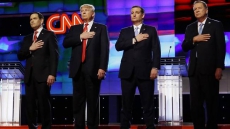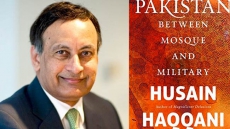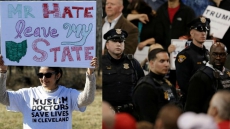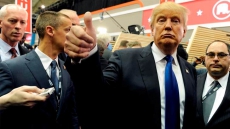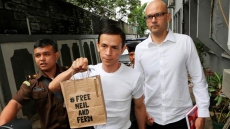Prosecution of jihadis in Pakistan is difficult as the system considers them to be "the good guys", according to Husain Haqqani, Pakistan's former envoy to the US.
Talking about his latest book, 'India vs Pakistan: Why Can't We Just be Friends?' Haqqani told IANS in an email interview that Pakistan considered jihad to be a low-cost option to bleed India and that this was the only way for it to ensure some form of military parity.
Haqqani, who's an integral part of the powerful elite in Islamabad and was adviser to four prime ministers, talks in his written replies about jihad, relations with India, Pakistan's own tryst with the scourge of terrorism, and the nexus between ISI -- Pakistan's military intelligence service -- and the Islamic jihadi forces. (Excerpts)
Q. Can you explain ex-ISI chief Shuja Pasha's statement on 26/11 terror attack, "Log hamare the, operation hamara nahi tha" (our people but it was not our operation)?
A. Pasha said, "our people" were involved, he didn't say it was Pakistan army officers or ISI men. Pasha could have meant Pakistanis or he could be referring to LeT (Lashkar-e-Taiba) as "our people." However, Pasha had told ex-CIA Director, General Michael Hayden, that "retired Pakistani army officers and retired intelligence officers" were involved in the planning. General Hayden says so in his book. Condoleezza Rice, then Secretary of State, has also written the same.
Since 26/11, Pakistan never went into the depth of the case even though proof was presented. We did arrest some, but we have not successfully prosecuted those responsible and until that is done, questions will remain.
Q. Rice had warned Pakistan to shut down terror operations. However, nothing has changed.
A. Prosecution is difficult in a system where jihadis targeting India are seen as 'the good guys'. Yes, Secretary Rice had told Islamabad to shut down all terrorist operations. But that wasn't the first time and certainly not the last. Pakistan has persisted with the same policy since the 1990s. When pushed by US on terror: first deny, then list Pakistani grievances, bring up Kashmir and blame India, provide commitments and assurances and end again with denial. This is not working.
Q. Though US had named Zakiur Rehman Lakhvi of LeT as the 26/11 mastermind, he is roaming around freely in Pakistan. What is stopping Islamabad from taking action?
A. Pakistan sees jihad as a low cost option to bleed India. The security apparatus views terrorism as irregular warfare. Islamabad feels this is the only way to ensure some form of military parity.
Q. Is there a concerted attempt by the Pakistan army to thwart peace talks?
A. As an analyst, I have seen that over the last 69 years, Indian and Pakistani leaders have met 53 times and yet been unable to change the course of their ties. Whenever the two try to move forward, the military has reacted. Civilian and army leaders have lost power after attempting to make peace.
Q. What should be Pakistan's policy on Kashmir?
A. Having a normal relationship, people-to-people ties and trade doesn't mean giving up on legal or political claim. The question I ask is: Is Kashmir really Pakistan's 'jugular vein' if it has survived for 69 years without it? Should the two risk nuclear mass destruction over a quarrel they have not been able to resolve for so long?
However, Pakistan's military has insisted on resolution of the Kashmir imbroglio before opening trade or travel.
Q. Pakistan's Kashmir policy remains by and large in the hands of the military even when a civilian prime minister holds office. How can we expect a solution?

A. Under civilian prime ministers, Pakistan has moved forward with India. But Pakistan's security establishment insists on controlling foreign and security policy, including the Kashmir policy. They have not been able to reach any long-lasting solution. Pakistanis realise that it is only civilian leaders who can actually reach a solution.
Q. In your opinion, Indira Gandhi had been magnanimous with the Shimla Pact, but Pakistanis saw the absence of pressure for a full settlement of Kashmir as an opportunity to keep the conflict alive. Should she have been more assertive on Kashmir?
A. Mrs Gandhi did not trust (prime minister) Zulfikar Ali Bhutto but she saw him as preferable to a military regime. For India, domestic unrest or balkanisation of Pakistan, is not a favorable development.
The compromise was to declare in Shimla that "the two countries are resolved to settle their differences by peaceful means through bilateral negotiations." This was meant to preclude any future war.
Q. The book mentions how Pakistan intelligence had passed on the information of 10 terrorists who sneaked into Gujarat in March. Do you feel that its a sincere move to preempt a crisis after Pathankot?
A. It's very positive that Pakistan has shared intelligence with India. But it was more because pressure from India and US. India cancelled scheduled talks and (Prime Minister Nawaz) Sharif was eager to resume dialogue. It was less likely that this move reflected concern for possible Indian casualties and was more to do with the need to deflect international pressure.
Q. Are you hopeful of a breakthrough in Indo-Pak relationship after Pathankot?
A. The two foreign secretaries met in New Delhi for the Heart of Asia conference and Prime Minister (Narendra) Modi is scheduled to travel to Islamabad for the SAARC summit in November this year. So, talks will continue as before but for a breakthrough, the two sides need to move beyond simply cancelling or rescheduling talks and create an environment for change.
Q. You also talk about the shrinking space for friendship and increasing 'saffronisation' of India. How harmful is this for ties?
A. Indo-Pak ties have become a victim of two parallel and contending nationalisms. In recent years, we are increasingly resembling each other in rage, resentment and public displays of religion.
Q. How do you see US policy towards Pakistan in the wake of US elections?
A. Neither of the current Presidential candidates have expressed a positive view of Pakistan. What should worry my countrymen is that entire US thinktank and the average American share the same view.
Hilary Clinton as Secretary of State in 2011 said, "You can't keep snakes in your backyard and expect them only to bite your neighbors." US policy towards Pakistan has been built on what I call 'Magnificent Delusions'. Pakistan saw the US as its superpower ally who would build its resources to stand up to India, but Washington never saw India as a threat.
US and Pakistan have very different goals but still assume they can get the other to work to their advantage.
